The Gerberian Shepsky is a medium-to-large dog breed, typically between 20 and 26 inches tall and weighing between 45 and 60 pounds. Their size depends on their parents’ genes. In general, Shepskies tend to be smaller than German Shepherds and larger than Siberian Huskies.
Shepsky
Breed Type: Crossbreed
Common nicknames: Gerberian Shepsky, Shepherd Huskies, Siberian Shepherds, German Husky
Coat: Double
Hypoallergenic: No, they will likely trigger allergies.
Temperament: Loyal, affectionate, intelligent, energetic
Life expectancy: 10-15 years
Color & patterns:

If trainers handed out superlatives in obedience class, the Gerberian Shepsky would definitely earn “Most Attractive” and “Hardest Worker.” Both their parent breeds, German Shepherds and Siberian Huskies, are working dogs. German Shepherds were bred for herding but became popular as police and military dogs. For their part, Siberian Huskies pulled sleds for nomadic tribes in Siberia. So, it makes sense that Shepskies are dogs with a strong work ethic and are happiest with a job. These pups are active, intelligent dogs, which means they need regular exercise. Their parent breeds are athletes and working dogs, so a quick walk around the block won’t be enough to meet their exercise needs. Shepskies need an exercise routine that includes lots of high intensity activities, such as hiking and running. You won’t be sitting still very long with this dog in your house.
Shepsky characteristics
Learn about about Shepsky basics like their fur colors, shedding levels, how much grooming they need, and other Shepsky facts.
Average height
20-26 inches (50.8-66.0cm)
Average weight
45-60 pounds (20.4-27.2 kg)
Average lifespan
10-15 years
Exercise needs
Grooming needs
Full-grown size
Good with cats
Good with kids
Training aptitude
What colors do Gerberian Shepskies come in?
Gerberian Shepskies can be pure white, black and tan, or a combination of black, silver, and tan. Their coats tend to be shaded and include distinct markings. Like other mixed breeds, the coloring of a Shepsky depends on their parents.
Do Shepskies shed?
Yes, Gerberian Shepskies are moderate-to-high shedders. Both German Shepherds and Siberian Huskies have double coats that consist of soft, dense undercoats and longer, straight outer coats, so you’ll need to regularly groom your Shepsky to keep their coat looking good. You might want to keep that dog brush handy or budget for professional grooming appointments.
In addition to shedding regularly, Shepskies will “blow” their coats seasonally; this sounds like a lot, but it mostly means you’ll see tumbleweeds of fur all over your house.
Shepsky temperament
Learn about about the Shepsky temperament and how well they fit into your lifestyle, home environment, and family.
Are Shepskies good with cats?
No, Shepskies will do best in a cat-free house. While some Gerberian Shepskies will accept cats, Siberian Huskies and German Shepherds can be unpredictable with smaller pets, including your kitty.
Are Shepskies okay with being alone?
Yes, Shepskies are okay with being alone as long as they have an outlet for their high energy. German Shepherds are known for having devoted, loving, and affectionate personalities, while Siberian Huskies are outgoing and affectionate. All that love and devotion is good, but Siberian Huskies are also known for forming strong bonds with their families and prefer near-constant companionship. Shepskies who inherit this temperament will become bored, lonely, and destructive if left alone for too long. Keep the leash ready for regular hikes, runs, and very long strolls.
Do Shepskies bark?
Yes, Shepskies bark. Expect Shepskies to bark when someone rings the doorbell or drops off packages on the porch. But — good news — neither of their parent breeds are known for being big barkers. If you do notice your pup excessively barking, it could be because they are bored or want attention.
Are Shepskies smart dogs?
Yes, Shepskies are very smart dogs. Dog sports such as agility, tracking, competitive obedience, sledding, carting, and skijoring (pulling a skier) provide physical exercise and help Shepskies keep their minds sharp. Other options for mental stimulation include puzzle feeders, toys, and games. These pups will seriously own a game of hide-and-seek or scent tracking.
Are Shepskies good family dogs?
Yes, active families will love Shepskies. After a day of activities (don’t forget that key part!), Shepskies will happily curl up on the couch for family movie nights. Shepskies who inherit a German Shepherd’s guardian aptitude will need early socialization and training to ensure they are accepting of strangers.
Are German Shepherd / Husky mixes easy to train?
Yes, German Shepherd / Husky mixes are relatively easy to train. The ancestors of these working dogs learned how to herd animals, pull sleds, and participate in search-and-rescue missions — all tasks that require outstanding intelligence and training. Gerberian Shepskies inherited those traits, making them easy to train. Because Shepskies are eager to learn, they respond well to reward-based training. But remember, training any dog — even a highly trainable breed — takes a lot of time, dedication, and patience.
Can Gerberian Shepskies be service dogs?
Yes, with a consistent training schedule and positive reinforcement, Gerberian Shepskies can master basic commands, learn new tricks, and even take on the role of service dogs. Sign up for obedience classes or work one-on-one with a trainer to make sure your Shepsky is a model canine citizen.
How much exercise does a Shepsky need?
Shepskies are highly active dogs who require one to two hours of exercise a day.
Shepsky health
Learn about about the Shepsky health outlook and what diseases they may be prone to at various stages of their life.
Do you need to groom a Gerberian Shepsky?
Yes, you need to groom a Gerberian Shepsky. At home, you can use a pin brush or metal comb to remove old hair and keep your pup’s coat clean and healthy; trimming the fur around their feet and toes also ensures their paws are clean. Trimming nails, cleaning ears, and brushing teeth should also be part of their grooming routine.
Are German Shepherd Husky mixes hypoallergenic?
No, German Shepherd Husky mixes aren’t considered a hypoallergenic breed, so if you have a dog allergy, they might not be the pup for you.
Are German Shepherd / Husky mixes healthy?
Shepskies can inherit some of their parent breeds’ prevalent health issues, including:
Hip and/or elbow dysplasia: Both German Shepherds and Huskies have a higher risk of developing hip and/or elbow dysplasia, a common skeletal disease in dogs where the joint has grown abnormally, resulting in pain, lameness, and possible osteoarthritis.
Eye issues: Shepskies may develop progressive retinal atrophy, a disease that causes degeneration of the retina at the back of the eye, which can result in vision loss; juvenile cataracts, which are cataracts formed before or right after birth; and corneal dystrophy, or eye diseases that involve changes in the cornea.
Degenerative myelopathy: Shepskies are also prone to degenerative myelopathy, a progressive disease that affects the spinal cord and results in hind-limb weakness and paralysis.
It’s important to remember that even though this breed might have an increased risk for certain health conditions, this doesn’t mean they will develop them. Mixed-breed dogs are often healthier than purebred dogs because of greater genetic diversity. Your veterinarian can help you watch for health problems with regular checkups.
Shepsky history
Learn about where this Shepsky came from!
What is a Gerberian Shepsky?
The Gerberian Shepsky is a cross between the German Shepherd and Siberian Husky — breeds known for their thick coats, expressive ears, and perfect puppy-dog eyes. Gerberian Shepskies, also known as Shepherd / Huskies or Shepskies, have a very distinct appearance and might look like a blue-eyed German Shepherd to you.
How long do Husky Shepherds live?
Shepskies have an average lifespan of seven to 15 years. However, individual lifespans can vary based on factors such as genetics, diet, exercise, healthcare, and overall lifestyle. Providing proper care, regular veterinary check-ups, a balanced diet, and maintaining a healthy weight can contribute to helping dogs of all breeds live long and healthy lives.
What were Shepskies bred for?
Shepskies started off as a “designer breed,” but there are many German Shepherd / Husky mixes at shelters across the country.
Find Shepsky puppies near you
Adopting a Shepsky
We don't see any Shepskies available for adoption in your exact location or cities near you, but here are some adorable similar breeds in Columbus, OH.
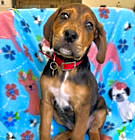
Thursday
Husky Hound (Unknown Type)
Female, 4 mos
Columbus, OH
Not good with dogs
Not good with cats
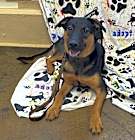
Rocco
German Shepherd Dog Labrador Retriever
Male, adult
New Albany, OH
Good with dogs
Good with cats
House-trained
Spayed or Neutered
Shots are up-to-date

Sassy
Siberian Husky Hound (Unknown Type)
Female, 2 yrs 4 mos
Lewis Center, OH
Not good with dogs
Not good with cats
Spayed or Neutered
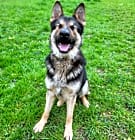
Loki
German Shepherd Dog
Male, 2 yrs 4 mos
Lewis Center, OH
Not good with dogs
Not good with cats
Spayed or Neutered
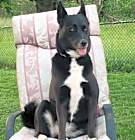
Dixie
Siberian Husky
Female, 3 yrs 10 mos
Lewis Center, OH
Good with dogs
Not good with cats
House-trained
Spayed or Neutered
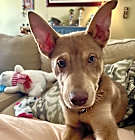
DINO
German Shepherd Dog Weimaraner
Male, 5 mos
Columbus, OH
Good with dogs
Not good with cats
House-trained
Spayed or Neutered
Shots are up-to-date
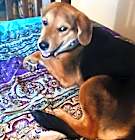
DIXIE
German Shepherd Dog Bernese Mountain Dog
Female, 8 mos
Columbus, OH
Good with dogs
Not good with cats
House-trained
Spayed or Neutered
Shots are up-to-date
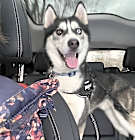
Cole
Husky
Male, young
Powell, OH
Good with dogs
Not good with cats
Needs experienced adopter
House-trained
Spayed or Neutered
Shots are up-to-date

Thursday
Husky Hound (Unknown Type)
Female, 4 mos
Columbus, OH
Not good with dogs
Not good with cats

Rocco
German Shepherd Dog Labrador Retriever
Male, adult
New Albany, OH
Good with dogs
Good with cats
House-trained
Spayed or Neutered
Shots are up-to-date

Sassy
Siberian Husky Hound (Unknown Type)
Female, 2 yrs 4 mos
Lewis Center, OH
Not good with dogs
Not good with cats
Spayed or Neutered

Loki
German Shepherd Dog
Male, 2 yrs 4 mos
Lewis Center, OH
Not good with dogs
Not good with cats
Spayed or Neutered

Dixie
Siberian Husky
Female, 3 yrs 10 mos
Lewis Center, OH
Good with dogs
Not good with cats
House-trained
Spayed or Neutered

DINO
German Shepherd Dog Weimaraner
Male, 5 mos
Columbus, OH
Good with dogs
Not good with cats
House-trained
Spayed or Neutered
Shots are up-to-date
